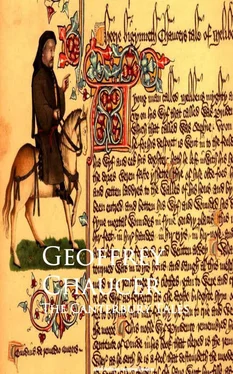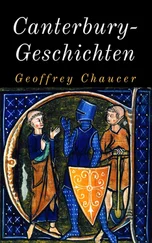Thou mayst have hir to lady and to wyf,
1290
For whom that I mot nedes lese my lyf.
For, as by wey of possibilitee,
Sith thou art at thy large, of prison free,
And art a lord, greet is thyn avauntage,
More than is myn, that sterve here in a cage.
1295
For I mot wepe and wayle, whyl I live,
With al the wo that prison may me yive,
And eek with peyne that love me yiveth also,
(440)
That doubleth al my torment and my wo.'
Ther-with the fyr of Ielousye up-sterte
1300
With-inne his brest, and hente him by the herte
So woodly, that he lyk was to biholde
The box-tree, or the asshen dede and colde.
Tho seyde he; 'O cruel goddes, that governe
This world with binding of your word eterne,
1305
And wryten in the table of athamaunt
Your parlement, and your eterne graunt,
What is mankinde more un-to yow holde
(450)
Than is the sheep, that rouketh in the folde?
For slayn is man right as another beste,
1310
And dwelleth eek in prison and areste,
And hath siknesse, and greet adversitee,
And ofte tymes giltelees, pardee!
1278. E. Resouned; rest Resouneth. Cp. Hl. yollyng; Pt. Ln. yellinge. 1290. All moste, most, muste; but read mot: see l. 1295. 1296. Hl. ȝyue; E. yeue. 1297. E. yeueth. 1299. Hl. Ielousye; E. Ialousie. 1303. Hl. Tho; E. Thanne. E. crueel gooddes(!). 1305. Hl. Cm. athamaunte; E. Atthamaunt. 1309. Cm. Hl. beste; E. beest. 1310. Cm. areste; Hl. arreste; E. arreest. 1312, 1314. Cm. Cp. Hl. gilteles; E. giltlees.
What governaunce is in this prescience,
That giltelees tormenteth innocence?
1315
And yet encreseth this al my penaunce,
[39: T. 1318-1353.]
That man is bounden to his observaunce,
For Goddes sake, to letten of his wille,
(460)
Ther as a beest may al his lust fulfille.
And whan a beest is deed, he hath no peyne;
1320
But man after his deeth moot wepe and pleyne,
Though in this world he have care and wo:
With-outen doute it may stonden so.
The answere of this I lete to divynis,
But wel I woot, that in this world gret pyne is.
1325
Allas! I see a serpent or a theef,
That many a trewe man hath doon mescheef,
Goon at his large, and wher him list may turne.
(470)
But I mot been in prison thurgh Saturne,
And eek thurgh Iuno, Ialous and eek wood,
1330
That hath destroyed wel ny al the blood
Of Thebes, with his waste walles wyde.
And Venus sleeth me on that other syde
For Ielousye, and fere of him Arcite.'
1315. Cm. Cp. Pt. Ln. encreseth; E. encresseth. 1320. So Hn. Cm. Hl.; rest after his deeth man. 1323. So Hl.; rest lete I. 1331. E. hise. 1333. E. Ialousie.
Now wol I stinte of Palamon a lyte,
1335
And lete him in his prison stille dwelle,
And of Arcita forth I wol yow telle.
The somer passeth, and the nightes longe
(480)
Encresen double wyse the peynes stronge
Bothe of the lovere and the prisoner.
1340
I noot which hath the wofullere mester.
For shortly for to seyn, this Palamoun
Perpetuelly is dampned to prisoun,
In cheynes and in fettres to ben deed;
And Arcite is exyled upon his heed
1345
For ever-mo as out of that contree,
Ne never-mo he shal his lady see.
1337. E. ( alone ) sonne. 1338. E. Encressen. 1344. Cm. Cp. Pt. vp ( perhaps rightly ).
Yow loveres axe I now this questioun,
(490)
Who hath the worse, Arcite or Palamoun?
That oon may seen his lady day by day,
1350
But in prison he moot dwelle alway.
That other wher him list may ryde or go,
[40: T. 1354-1386.]
But seen his lady shal he never-mo.
Now demeth as yow liste, ye that can,
For I wol telle forth as I bigan.
1347. E. Now ( wrongly ); rest Yow. 1350. Hn. Cp. Pt. moot he. 1353. Ln. liste; Cm. lyste; Hl. luste; rest list.
Explicit prima Pars. Sequitur pars secunda.
1355
Whan that Arcite to Thebes comen was,
Ful ofte a day he swelte and seyde 'allas,'
For seen his lady shal he never-mo.
(500)
And shortly to concluden al his wo,
So muche sorwe had never creature
1360
That is, or shal, whyl that the world may dure.
His sleep, his mete, his drink is him biraft,
That lene he wex, and drye as is a shaft.
His eyen holwe, and grisly to biholde;
His hewe falwe, and pale as asshen colde,
1365
And solitarie he was, and ever allone,
And wailling al the night, making his mone.
And if he herde song or instrument,
(510)
Then wolde he wepe, he mighte nat be stent;
So feble eek were his spirits, and so lowe,
1370
And chaunged so, that no man coude knowe
His speche nor his vois, though men it herde.
And in his gere, for al the world he ferde
Nat oonly lyk the loveres maladye
Of Hereos, but rather lyk manye
1375
Engendred of humour malencolyk,
Biforen, in his celle fantastyk.
And shortly, turned was al up-so-doun
(520)
Bothe habit and eek disposicioun
Of him, this woful lovere daun Arcite.
1359. Hl. Pt. Ln. had; rest hadde. 1362. E. Pt. wexeth. 1364. Hi. Cm. Cp. falwe; E. Hn. falow. 1369. E. spiritz. 1376. E. Biforn his owene; Cm. Be-forn hese owene; Hn. Cp. Pt. Ln. Biforn his; Hl. Beforne in his.
1380
What sholde I al-day of his wo endyte?
Whan he endured hadde a yeer or two
This cruel torment, and this peyne and wo,
At Thebes, in his contree, as I seyde,
Up-on a night, in sleep as he him leyde,
[41: T. 1387-1424.]
1385
Him thoughte how that the winged god Mercurie
Biforn him stood, and bad him to be murye.
His slepy yerde in hond he bar uprighte;
(530)
An hat he werede up-on his heres brighte.
Arrayed was this god (as he took keep)
1390
As he was whan that Argus took his sleep;
And seyde him thus: 'To Athenes shaltou wende;
Ther is thee shapen of thy wo an ende.'
And with that word Arcite wook and sterte.
'Now trewely, how sore that me smerte,'
1395
Quod he, 'to Athenes right now wol I fare;
Ne for the drede of deeth shal I nat spare
To see my lady, that I love and serve;
(540)
In hir presence I recche nat to sterve.'
1382. E. crueel. 1388. E. vp ( perhaps rightly ); rest vp-on. 1389. E. I; rest he.
And with that word he caughte a greet mirour,
1400
And saugh that chaunged was al his colour,
And saugh his visage al in another kinde.
And right anoon it ran him in his minde,
That, sith his face was so disfigured
Of maladye, the which he hadde endured,
1405
He mighte wel, if that he bar him lowe,
Live in Athenes ever-more unknowe,
And seen his lady wel ny day by day.
(550)
And right anon he chaunged his array,
And cladde him as a povre laborer,
1410
And al allone, save oonly a squyer,
That knew his privetee and al his cas,
Which was disgysed povrely, as he was,
To Athenes is he goon the nexte way.
And to the court he wente up-on a day,
1415
And at the gate he profreth his servyse,
To drugge and drawe, what so men wol devyse.
And shortly of this matere for to seyn,
(560)
He fil in office with a chamberleyn,
The which that dwelling was with Emelye.
1420
For he was wys, and coude soon aspye
Of every servaunt, which that serveth here.
Wel coude he hewen wode, and water bere,
[42: T. 1425-1461.]
Читать дальше












